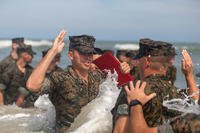WASHINGTON -- This month is Suicide Prevention Month, and Defense Secretary Chuck Hagel has said preventing military suicides is one of the Defense Department's highest priorities.
"As we observe Suicide Prevention Month," he said in a message to the department's workforce, "we must rededicate ourselves to actively working not only every month, but every day to fulfill our collective responsibility to watch out for each other and take care of each other."
This is the first article in a four-part series about a Navy petty officer who came close to taking his own life but did not do so, thanks to the intervention of his leadership and the use of support networks, and how he continues to brave his battle with alcoholism and depression.
Navy Petty Officer 1st Class Jason Thompson, a mass communication specialist, is an instructor at a joint command in Maryland. He began his journey in Detroit as the child of a mother and stepfather who were drug users. He suffered physical and emotional trauma, he said, and his mother repeatedly told him he was a liar and a cheater, that he was stupid, and that life was only going to get worse.
Because of this, Thompson said, he first thought of suicide when he was 8 years old, and he attempted it when he was 9.
Early Suicide Attempts
"I tried to hang myself," he said, "but I didn't understand the physics of hanging, so I wound up embarrassed on my closet floor with a wooden clothes hanger bar snapped and all of my clothes on top of me and a belt around my neck."
When he was 11, his mother found him with a gun before he had the chance to pull the trigger, and then at 13, he thought about using a knife to cut his wrists. With every attempt, he said, he was told, "Just get over it" and "Just toughen up," or he received more disciplinary action instead of therapy or counseling.
At 14, he shoplifted a toy train for his little brother, and when his mother found out, she had him put his hands against a cinder-block wall in the basement. As she beat his hands, she would miss and hit his back, legs and head with a block of wood. He said he could not sit down for two days and had to administer self-aid.
While living his mother could be challenging, Thompson said, his father fought for custody and was a positive influence in his life.
"My father was and remains my best friend," he said. "Unfortunately, given Michigan's legal processes at the time and my mother and stepfather's unified efforts, I was terrified to speak out against them, and my father simply could not get any legal recourse.
"Over the course of weekends and holidays," he continued, "my father and I bonded truly as a parent and child should. We continue an excellent dialogue that both nurtures and guides while also being a slapstick comedy show. He's one of four people in my entire family I speak to regularly."
Choosing Navy Service Over Suicide
Thompson said he thought again about suicide at 18, but decided his best way forward was joining the Navy, and he enlisted July 7, 1998. He began his naval career as an undesignated seaman aboard the guided missile destroyer USS John Paul Jones, where he became a boatswain's mate and then a quartermaster. In 2003, he cross-rated into the journalism career field, and then in 2006, the career field merged into the mass communication specialist rating.
"My time in the Navy has been adventurous," Thompson said. "It has been bittersweet at times. It has been melancholy and lonely at times. My time in the Navy has been marked by tidal shifts of long periods of sustained superior performance and also intense depression, melancholy, loneliness and dystopia."
Navy Senior Chief Petty Officer Misty Hubbard, the Navy element senior enlisted advisor at Thompson's command, has known him for 11 years. They first served together aboard the USS Enterprise in Norfolk, Virginia, when Thompson was a petty officer 3rd class, and as an petty officer 1st class at the time, she was the lead petty officer of 10 mass communications sailors on the ship. The ship would deploy for six months at a time, and the sailors would work 12- to 16-hour days.
Hubbard said she can describe Thompson in one word: "phenomenal."
"He's always been a phenomenal worker," she added. "We used to tease him all the time [that] he was Superman. Anything that needed to be done well and quickly went to him, because he could perform like a champ in a pinch. He did great work under pressure -- really enjoyed tight deadlines, because adrenaline went up in those kinds of circumstances. He was always an incredible worker in that regard. The challenge was he wasn't very good at letting people know when he was overwhelmed or when he had taken too much on his plate."
Hubbard said that when people are deployed, they learn each other's quirks, and that one of Thompson's quirks was that he had a bit of a temper and would have little "hiccups."
"He would have a blow-up but then he would very quickly get control of himself again and pull himself back together," she said. "And 95 percent of the time, he was No. 1, on fire, with a bullet -- just [an] incredible sailor [and] worker.
"But every three or four months, you could guarantee he was going to do something impulsive and silly and not well thought out that was going to result in him getting in trouble," she continued. "And he would have to bank on all the great work he had done up until that point to kind of rescue himself from the situation he would get himself in about once a quarter. You could guarantee that about once a quarter, Thompson was going to do something stupid."
Thompson kept in touch with Hubbard and maintained a protegee and mentor relationship with her. They met back up as instructors at the joint command, and Hubbard continued providing professional development to Thompson and felt responsible for him.
Passed Over for Promotion
In 2012, Hubbard said, she started noticing a change in Thompson when the chief petty officer promotion boards did not select him.
"Initially, he took it hard, which is not abnormal," she said, and we sat down and talked about what were the factors that prevented him from getting promoted and what could we focus on in the upcoming year to make him more competitive for promotion. In my mind, that's when it started -- he wasn't selected for promotion."
Not long after that, she said, Thompson broke up with his girlfriend, a relationship she said was one of the healthiest she had seen Thompson in since she had known him.
"He didn't get promoted; the relationship ended; those were two big things that happened within a few months' span," she said. "He started oversleeping, showing up unshaven with his uniform not looking its best, and then he missed a duty day. He was behaving out of character. These are the sort of things you see from a junior sailor who is struggling to adapt to Navy life. This is not what you see all of a sudden from this senior E-6 who's been in the Navy for 14 years.
"It went from a slip every three or four months to a screw-up every other week or every week," she said. "We verbally counseled him and did written counseling to document this stuff to explain to him that these things were going to be factors in his annual performance evaluation. There was just no way around it."
During this time, Thompson, at age 32, had decided he was going to take a jump off the Duke Ellington Bridge in Washington, D.C.
"I didn't give away any of my possessions," he said, "but I did write two suicide letters, one of which I was going to pin to my body for emergency people to find. One had emergency contact information, how to unlock my apartment door, and how to enter my cell phone, and then I left the other one at the house for my dad to read. I also talked about where all of my stuff was going to go."
He said he did not say goodbye to anyone, because he did not want to give away any kind of signs.
"I didn't want an intervention," he explained. "I didn't want to cry for help. That wasn't my interest. That wasn't my goal. My goal was to die. I wanted to die."
This is the first article in a four-part series:









